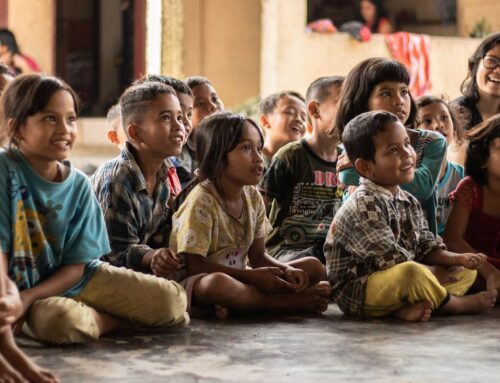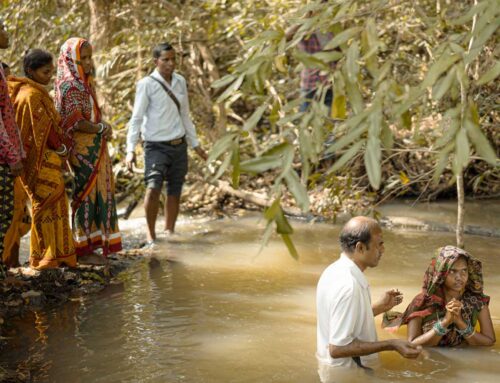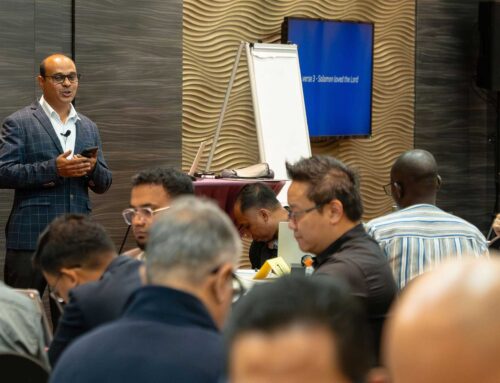The Global Insight of the Next Generation
The world is undergoing an unprecedented generational transition. Rapid shifts in digital technology, urbanization, and — in many places — an expanding middle class are creating an experiential and cultural divide between young people and their parents and grandparents. The shift is most pronounced in the “Global South” — Asia, Africa, and Latin America — where 90% of our world’s youth live.
In April, through our new Global Insight initiative, Haggai gathered 40 participants — a mix of our most pioneering young leaders and those invested in their equipping — online for our first-ever international NextGen forum. The event was called Switch: NextGen Lab, and together, we surfaced the bridges and barriers to engaging young leaders from the Global South more deeply in God’s mission. The gathering was the first of many, setting the table for deeper insights that naturally lead to transformative action.
Our Switch community will continue to unveil both the perils and promise of the next generation of missional leaders, but I want to share with you a summary of current research.
Youth populations are growing fastest in Sub-Saharan Africa and South Asia where population growth is most rapid. The younger demographic forms the smallest percentage of the population in high-income Western nations and in countries like Japan and South Korea. Christian growth is slowest in these aging, wealthy regions — where the average age of a Christian is 40. And Christian growth is fastest in young, lower- and middle-income regions — where the average age is 19 in the case of Sub-Saharan Africa.
The fast-growing regions also contain the highest concentrations of people unreached with the Gospel. Such contexts possess great material and physical needs as well, and thus are places where holistic witness to Christ and His Kingdom can thrive.
The NextGen, particularly in the Global South, longs for a different world but finds many barriers to their aspirations. They show a strong distrust of established leaders and institutions but also a discomfort with taking on leadership roles. Young leaders long for mentorship from their elders but find it sparse. In contexts with a high proportion of youth, youth are seen primarily as a problem to be managed and not a source of insight and innovation that should be invested in.
Among young people, corruption of leaders and environmental degradation are seen as the top two global problems. Most young leaders believe solutions to these problems will be pioneered by individuals, not institutions.
This trend extends to Christian youth, who primarily look to their family, peers, and digital networks for faith formation instead of local religious leaders. Committed Christian youth are resistant to the types of religious nationalism growing in Russia, India, and the United States, and prefer global or regional Christian networks mediated by digital technologies for meta-level religious belonging and influence. It is important to emphasize that Christian youth are being formed in their faith in multiple spheres, both locally through in-person interactions and globally through digital platforms.
Young people — whether Christian or not — are caught up in the segmenting and dividing of generations in our increasingly consumeristic societies. The fragmentation leaves us all impoverished, depriving the Body of Christ of the Gospel’s power to unite and transform.
All Global Insight initiatives begin with the assumption that the Holy Spirit is up to good things within and beyond our Haggai network. We want to surface that good, bring it together, and catalyze deeper participation in God’s transformative work where there is the greatest need. Young missional leaders — like Javis in Uganda — find themselves on the leading edge of God’s mission in a rapidly changing world. We must not shy away from their sorrows or their unharnessed strengths. We need them to guide all of us into God’s hope-filled future.
Written by Dr. Tyler Lenocker V.P. of Global Research
References: The Connected Generation. Barna, 2020. https://theconnectedgeneration.com/. • Sharlene Swartz et al (eds.). The Oxford Handbook of Global South Youth Studies. Oxford: Oxford University Press, 2020. • Global Shapers Survey. World Economic Forum, 2017. https://www.globalshapers.org/. • Corey Seemiller and Meghan Grace. Generation Z: A Century in the Making. London: Routledge, 2019.
The Global Insight of the Next Generation
The world is undergoing an unprecedented generational transition. Rapid shifts in digital technology, urbanization, and — in many places — an expanding middle class are creating an experiential and cultural divide between young people and their parents and grandparents. The shift is most pronounced in the “Global South” — Asia, Africa, and Latin America — where 90% of our world’s youth live.
In April, through our new Global Insight initiative, Haggai gathered 40 participants — a mix of our most pioneering young leaders and those invested in their equipping — online for our first-ever international NextGen forum. The event was called Switch: NextGen Lab, and together, we surfaced the bridges and barriers to engaging young leaders from the Global South more deeply in God’s mission. The gathering was the first of many, setting the table for deeper insights that naturally lead to transformative action.
Our Switch community will continue to unveil both the perils and promise of the next generation of missional leaders, but I want to share with you a summary of current research.
Youth populations are growing fastest in Sub-Saharan Africa and South Asia where population growth is most rapid. The younger demographic forms the smallest percentage of the population in high-income Western nations and in countries like Japan and South Korea. Christian growth is slowest in these aging, wealthy regions — where the average age of a Christian is 40. And Christian growth is fastest in young, lower- and middle-income regions — where the average age is 19 in the case of Sub-Saharan Africa.
The fast-growing regions also contain the highest concentrations of people unreached with the Gospel. Such contexts possess great material and physical needs as well, and thus are places where holistic witness to Christ and His Kingdom can thrive.
The NextGen, particularly in the Global South, longs for a different world but finds many barriers to their aspirations. They show a strong distrust of established leaders and institutions but also a discomfort with taking on leadership roles. Young leaders long for mentorship from their elders but find it sparse. In contexts with a high proportion of youth, youth are seen primarily as a problem to be managed and not a source of insight and innovation that should be invested in.
Among young people, corruption of leaders and environmental degradation are seen as the top two global problems. Most young leaders believe solutions to these problems will be pioneered by individuals, not institutions.
This trend extends to Christian youth, who primarily look to their family, peers, and digital networks for faith formation instead of local religious leaders. Committed Christian youth are resistant to the types of religious nationalism growing in Russia, India, and the United States, and prefer global or regional Christian networks mediated by digital technologies for meta-level religious belonging and influence. It is important to emphasize that Christian youth are being formed in their faith in multiple spheres, both locally through in-person interactions and globally through digital platforms.
Young people — whether Christian or not — are caught up in the segmenting and dividing of generations in our increasingly consumeristic societies. The fragmentation leaves us all impoverished, depriving the Body of Christ of the Gospel’s power to unite and transform.
All Global Insight initiatives begin with the assumption that the Holy Spirit is up to good things within and beyond our Haggai network. We want to surface that good, bring it together, and catalyze deeper participation in God’s transformative work where there is the greatest need. Young missional leaders — like Javis in Uganda — find themselves on the leading edge of God’s mission in a rapidly changing world. We must not shy away from their sorrows or their unharnessed strengths. We need them to guide all of us into God’s hope-filled future.
Written by Dr. Tyler Lenocker V.P. of Global Research
References: The Connected Generation. Barna, 2020. https://theconnectedgeneration.com/. • Sharlene Swartz et al (eds.). The Oxford Handbook of Global South Youth Studies. Oxford: Oxford University Press, 2020. • Global Shapers Survey. World Economic Forum, 2017. https://www.globalshapers.org/. • Corey Seemiller and Meghan Grace. Generation Z: A Century in the Making. London: Routledge, 2019.
The Global Insight of the Next Generation
The world is undergoing an unprecedented generational transition. Rapid shifts in digital technology, urbanization, and — in many places — an expanding middle class are creating an experiential and cultural divide between young people and their parents and grandparents. The shift is most pronounced in the “Global South” — Asia, Africa, and Latin America — where 90% of our world’s youth live.
In April, through our new Global Insight initiative, Haggai gathered 40 participants — a mix of our most pioneering young leaders and those invested in their equipping — online for our first-ever international NextGen forum. The event was called Switch: NextGen Lab, and together, we surfaced the bridges and barriers to engaging young leaders from the Global South more deeply in God’s mission. The gathering was the first of many, setting the table for deeper insights that naturally lead to transformative action.
Our Switch community will continue to unveil both the perils and promise of the next generation of missional leaders, but I want to share with you a summary of current research.
Youth populations are growing fastest in Sub-Saharan Africa and South Asia where population growth is most rapid. The younger demographic forms the smallest percentage of the population in high-income Western nations and in countries like Japan and South Korea. Christian growth is slowest in these aging, wealthy regions — where the average age of a Christian is 40. And Christian growth is fastest in young, lower- and middle-income regions — where the average age is 19 in the case of Sub-Saharan Africa.
The fast-growing regions also contain the highest concentrations of people unreached with the Gospel. Such contexts possess great material and physical needs as well, and thus are places where holistic witness to Christ and His Kingdom can thrive.
The NextGen, particularly in the Global South, longs for a different world but finds many barriers to their aspirations. They show a strong distrust of established leaders and institutions but also a discomfort with taking on leadership roles. Young leaders long for mentorship from their elders but find it sparse. In contexts with a high proportion of youth, youth are seen primarily as a problem to be managed and not a source of insight and innovation that should be invested in.
Among young people, corruption of leaders and environmental degradation are seen as the top two global problems. Most young leaders believe solutions to these problems will be pioneered by individuals, not institutions.
This trend extends to Christian youth, who primarily look to their family, peers, and digital networks for faith formation instead of local religious leaders. Committed Christian youth are resistant to the types of religious nationalism growing in Russia, India, and the United States, and prefer global or regional Christian networks mediated by digital technologies for meta-level religious belonging and influence. It is important to emphasize that Christian youth are being formed in their faith in multiple spheres, both locally through in-person interactions and globally through digital platforms.
Young people — whether Christian or not — are caught up in the segmenting and dividing of generations in our increasingly consumeristic societies. The fragmentation leaves us all impoverished, depriving the Body of Christ of the Gospel’s power to unite and transform.
All Global Insight initiatives begin with the assumption that the Holy Spirit is up to good things within and beyond our Haggai network. We want to surface that good, bring it together, and catalyze deeper participation in God’s transformative work where there is the greatest need. Young missional leaders — like Javis in Uganda — find themselves on the leading edge of God’s mission in a rapidly changing world. We must not shy away from their sorrows or their unharnessed strengths. We need them to guide all of us into God’s hope-filled future.
Written by Dr. Tyler Lenocker V.P. of Global Research
References: The Connected Generation. Barna, 2020. https://theconnectedgeneration.com/. • Sharlene Swartz et al (eds.). The Oxford Handbook of Global South Youth Studies. Oxford: Oxford University Press, 2020. • Global Shapers Survey. World Economic Forum, 2017. https://www.globalshapers.org/. • Corey Seemiller and Meghan Grace. Generation Z: A Century in the Making. London: Routledge, 2019.
Comments
Comments
-
[…] also two stories with research and reflection about emerging generations in the Global South, Global Insight of the Next Generation (Haggai International) and The Future of Faith: Reaching a New Generation around the World (The […]
















[…] also two stories with research and reflection about emerging generations in the Global South, Global Insight of the Next Generation (Haggai International) and The Future of Faith: Reaching a New Generation around the World (The […]